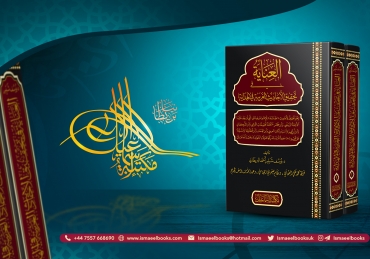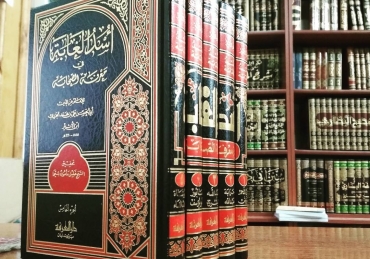Ḥadīth query: Ḥasan, Ḥusayn and Jibrīl narration
Question
Can you kindly comment on the authenticity of the following narration?
عن ابن عباس قال: اتحد الحسن والحسين عند رسول الله صلى الله عليه وسلم ، فجعل يقول: هي يا حسن ، خذ يا حسن ، فقالت عائشة: تعين الكبير ؟ قال: إن جبريل يقول: خذ يا حسين
بسم الله الرحمن الرحیم
Answer
This narration has been transmitted by Imam Ibn Saʿd (d. 230/845)[1] from ʿAlī ibn Muḥammad al-Madāʾinī (d. 224-5/838-40) from Ḥammād ibn Salamah (d. 167/784) from ʿAmmār ibn Abī ʿAmmār (d. after 120/738) from ʿAbd Allah ibn ʿAbbās (d. 68/687-8) (may Allah be pleased with him). The status of the narration is ḥasan (acceptable).
Abū al-Ḥasan ʿAlī ibn Muḥammad al-Madāʾinī al-Akhbārī (d. 224-5/838-40) has been classified as truthful by Ḥāfiẓ Dhahabī (d. 748/1348) and trustworthy by Imam Yaḥyā ibn Maʿīn (d. 233/848) whilst Imam Ibn ʿAdī (d. 365/976) said he is not strong.[2] ʿAllāmah Ṣafdī (d. 764/1363) suggests that he is reliable when he narrates from reliable narrators.[3] Abū Salamah Ḥammād ibn Salamah ibn Dīnār al-Baṣrī (d. 167/784) has been described as Shaykh al-Islām and an ocean of knowledge[4], and his narrations are transmitted in Ṣaḥīḥ Muslim.[5] Abū ʿUmar or Abū ʿAbd Allah ʿAmmār ibn Abī ʿAmmār (d. after 120/738) has been deemed as trustworthy by Imam Aḥmad (d. 241/855), Imam Abū Dāwūd (d. 275/889), Imam Abū Zurʿah (d. 264/878), Imam Abū Ḥātim (d. 277/890) and others[6], and he has a narration in Ṣaḥīḥ Muslim.[7]
Ḥāfiẓ Dhahābī (d. 748/1348)[8] has quoted this narration citing Ibn Saʿd (d. 230/845). Imam Ibn ʿAsākir (d. 571/1176)[9] has also transmitted this narration through his chain via Ibn Saʿd, though there is a slight variation in one of the words of the narration in the published version.
It is worth noting that a narration from the companions ʿAlī ibn Abī Ṭālib (d. 40/661) (may Allah be pleased with him) with a similar meaning has been narrated by Imam Ibn ʿAsākir (d. 571/1176).[10] The narration has also been mentioned by Ḥāfiẓ Dhahabī (d. 748/1348)[11] and Ḥāfiẓ Ibn Ḥajar (d. 852/1449)[12] although both have narrated it as mursal (a chain wherein a tābiʿī transmits directly from the Prophet ﷺ) from Muḥammad ibn ʿAlī (d. 114/732-3). However, it is extremely weak due to ʿAlī ibn ʿAlī al-Lahabī (n.d.), a transmitter of unknown narrations.[13] Shaykh ʿAlī al-Muttaqī (d. 975/1567) attributes this narration of ʿAlī (d. 40/661) (may Allah be pleased with him) to Ibn Shāhīn (d. 385/995-6) and suggests there are no defects within the chain except that there is a gap and a missing narrator therein.[14]
A similar narration from Abū Hurayrah (d. 57/676-7) (may Allah be pleased with him) has also been narrated by Imam Ibn ʿAdī (d. 365/976)[15] and Imam Ibn al-Athīr (d. 630/1233)[16] and has been mentioned by Ḥāfiẓ Ibn Ḥajar (d. 852/1449).[17] However, this narration is also extremely weak due to Abū Ḥafṣ ʿUmar ibn Abī Khalīfah al-ʿAbdī al-Baṣrī (d. 189/804-5), a controversial narrator regarding whom there are mixed views.[18]
Allah knows best
Yusuf Shabbir
25 Rajab 1437 / 2 May 2016
Footnotes
[1] Al-Ṭabaqāt al-Kubrā, Mutammim al-Ṣaḥābah, al-Ṭabaqah al-Khāmisah (1: 285).
[2] Al-Mugnī Fi al-Ḍuʿafāʾ (2: 454); Mīzān al-Iʿtidāl (3: 153); Lisān al-Mīzān (6: 13).
[3] Al-Wāfī Bi al-Wafayāt (22: 29).
[4] Siyar (7: 444); Tahdhīb al-Kamāl (7: 253); Tadhkirah al-Ḥuffāẓ (1: 151).
[5] Ṣaḥīḥ Muslim (527; 640; 649).
[6] Tahdhīb al-Kamāl (21: 198).
[7] Ṣaḥīḥ Muslim (2353).
[8] Siyar (3: 266).
[9] Tārīkh Dimashq (13: 223).
[10] Tārīkh Dimashq (14: 165).
[11] Siyar (3: 284).
[12] Al-Maṭālib al-ʿĀliyah (3966).
[13] Al-Tārikh al-Awsaṭ (2: 192); al-Jarḥ Wa al-Taʿdīl (6: 197); al-Majrūḥīn (2: 107); al-Mugnī Fī al-Ḍuʿafāʾ (2: 452); Mīzān al-Iʿtidāl (3: 147); Lisān al-Mīzān (5: 566).
[14] Kanz al-ʿUmmāl (13: 661).
[15] Al-Kāmil Fī Ḍuʿafāʾ al-Rijāl (6: 34).
[16] Usd al-Gābah (2: 24).
[17] Al-Iṣābah (1: 332).
[18] Tahdhīb al-Kamāl (21: 230); al-Mugnī Fī al-Duʿafāʾ (2: 463); Mīzān al-Iʿtidāl (3: 192); Ikmāl Tahdhīb al-Kamāl (10: 47); Tahdhīb al-Tahdhīb (7: 443); Lisān al-Mīzān (6: 88, 94).







Who are the leaders of the youth in Paradise: Abu Sufyan or Hasan and Husayn